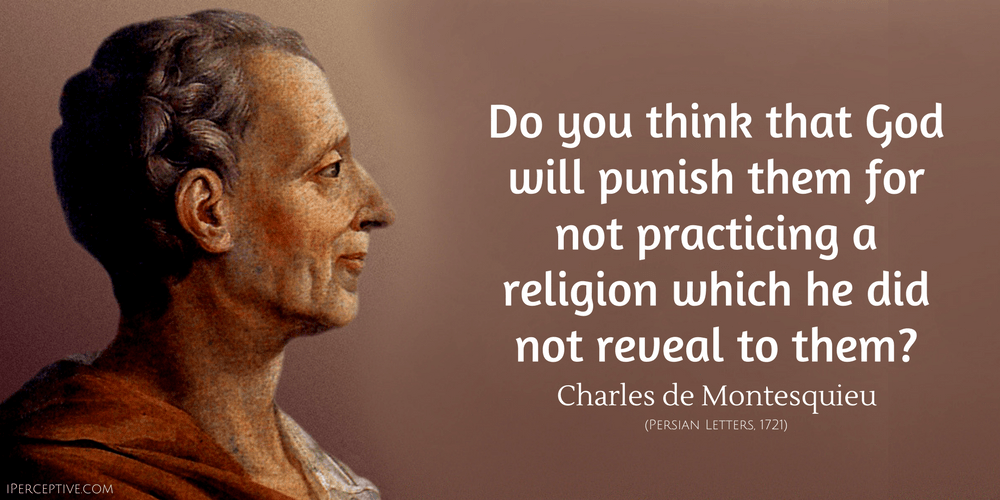Charles de Montesquieu Quotes

The prejudices of superstition are superior to all others, and have the strongest influence on the human mind.
Do you think that God will punish them for not practicing a religion which he did not reveal to them?
I would as soon say that religion gives its professors a right to enslave those who dissent from it, in order to render its propagation more easy.
It is not the young people that degenerate; they are not spoiled till those of maturer age are already sunk into corruption.
People here argue about religion interminably, but it appears that they are competing at the same time to see who can be the least devout.
There are only two cases in which war is just: first, in order to resist the aggression of an enemy, and second, in order to help an ally who has been attacked.
But constant experience shows us that every man invested with power is apt to abuse it, and to carry his authority as far as it will go.
There is only one thing that can form a bond between men, and that is gratitude...we cannot give someone else greater power over us than we have ourselves.
In republican governments, men are all equal; equal they are also in despotic governments: in the former, because they are everything; in the latter, because they are nothing.
Religious wars are not caused by the fact that there is more than one religion, but by the spirit of intolerance...the spread of which can only be regarded as the total eclipse of human reason.
The alms given to a naked man in the street do not fulfil the obligations of the state, which owes to every citizen a certain subsistence, a proper nourishment, convenient clothing, and a kind of life not incompatible with health.
If one only wished to be happy, this could be easily accomplished; but we wish to be happier than other people, and this is always difficult, for we believe others to be happier than they are.
If I knew of something that could serve my nation but would ruin another, I would not propose it to my prince, for I am first a man and only then a Frenchman...because I am necessarily a man, and only accidentally am I French.
As distant as heaven is from the earth, so is the true spirit of equality from that of extreme equality... In a true state of nature, indeed, all men are born equal, but they cannot continue in this equality. Society makes them lose it, and they recover it only by the protection of laws.
Luxury is therefore absolutely necessary in monarchies; as it is also in despotic states, In the former, it is the use of liberty, in the latter, it is the abuse of servitude...
Hence arrives a very natural reflection. Republics end with luxury; monarchies with poverty.
Slavery, properly so called, is the establishment of a right which gives to one man such a power over another as renders him absolute master of his life and fortune. The state of slavery is in its own nature bad. It is neither useful to the master nor to the slave; not to the slave, because he can do nothing through a motive of virtue; nor to the master, because by having an unlimited authority over his slaves he insensibly accustoms himself to the want of all moral virtues, and thence becomes fierce, hasty, severe, choleric, voluptuous, and cruel. ... where it is of the utmost importance that human nature should not be debased or dispirited, there ought to be no slavery.

